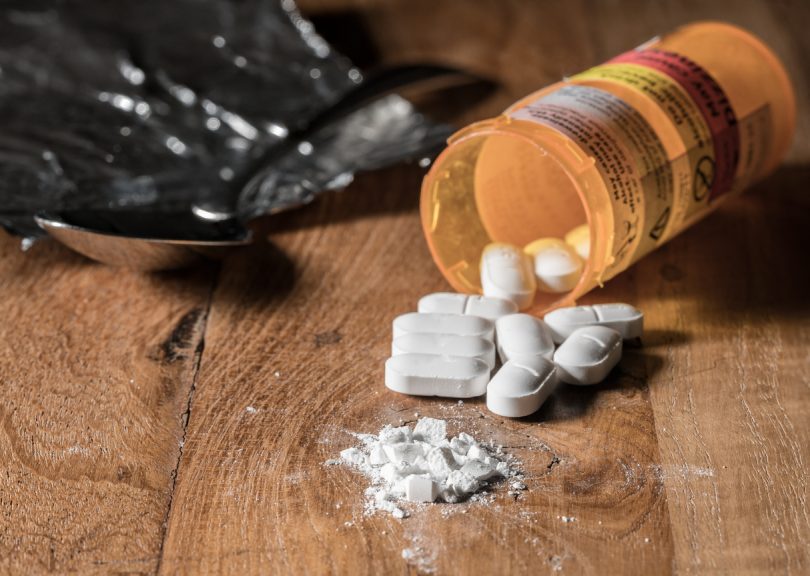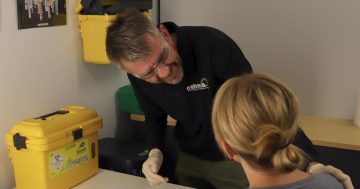
For those who get caught with drugs, it’s the beginning of an often lengthy legal process that can carry severe penalties.
With Groovin the Moo and Spilt Milk attracting thousands of festival-goers, and a report from the Australian Criminal Intelligence Commission revealing Canberrans are among the biggest heroin, oxycodone and cocaine users in the country, drugs in our nation’s capital has been a hot topic this year.
Pill testing proved to be more than a little controversial, with the National Capital Authority quashing plans to make it available at Spilt Milk after its relative success at Groovin the Moo at the University of Canberra in April.
And while not everyone who attends music events intends to take drugs, police are all too familiar with the connection between festivals and drug-taking, and take no chances with extra patrols and targeted alcohol and drug testing during and after events.
For those who get caught, it’s the beginning of an often lengthy legal process that can carry severe penalties, including substantial fines and prison time. This is especially true for those who have agreed to carry drugs for their friends and may receive additional charges for supply, or may tip the scales at a sufficient quantity to be charged with trafficking.
Claire Natoli, solicitor from Baker Deane and Nutt (BD&N) Lawyers, explains:
“The police and courts take a very strong stance against drugs, because drug users have an increased risk of hurting themselves and those around them. What pill testing has shown us is that some people think they are buying one drug, but they are actually getting another, which can increase the risk of harm.”
Claire says that drugs charges can happen at an event or days afterwards, with extra police on the lookout for drug driving offenders.
“Drugs can stay in your body for days or even weeks in some cases. So even though you may not feel under the influence, drugs could still be detected in your system which is enough for you to be charged.”
What happens when you’re charged
If you’re caught with drugs or driving under the influence of drugs, you may be taken to the police station to be drug tested. If you have drugs on you, they will be sent to a special laboratory for testing.
“It can take a while for the results of a laboratory drug test to come back and for people to receive their summons for court,” says Claire. “So someone who came to the attention of police at Spilt Milk may not know the specifics or extent of their charges until January.”
“If you plead not guilty, you will be allocated a date for a hearing, or for more serious offences there will be a trial. If you plead guilty, you will still be required to attend court to be sentenced.”
The penalties
The penalties for drug-related offences differ depending on the amount you were carrying.
To put this into perspective, cannabis possession (between 50g and 330g) can carry a penalty of up to $7500 and/or two years imprisonment. Anything higher than that and you tip the scales at a traffickable offence which carries penalties of up to 10 years in prison and a $150,000 fine.
Carrying prescription medications that are not yours can also land you in big trouble, with penalties ranging from community service to fines and even jail time.
“Possession of certain prescription medications that aren’t yours, including codeine, oxycodone or ADHD medication is treated very seriously, with fines in the thousands of dollars and potential imprisonment,” warns Claire.
“You may be subject to additional charges and penalties if you are suspected of supplying drugs, including to your friends, even if you did not intend on making money – with possible fines of up to $75,000 and/or five years in prison. If you are caught with money suspected of being the proceeds of crime, you could face a fine of up to $30,000 and/or two years in prison.”
In addition to possible fines, community service, and/or jail time, almost all drug-related offences result in a criminal record which can have negative impacts on job prospects, travel, and so on in the future.
Your lawyer’s role
Claire says it’s important to have a lawyer attend court with you, because you will need to prepare thoroughly. If you have substance abuse problems, mental health issues or are facing a serious penalty, you can request court-ordered reports. These reports don’t cost anything, but may help to provide more information and context around your offending.
“As a lawyer, we don’t judge you. Our job is to prepare you, advise you, and make sure your side is heard.
“If you plead not guilty, the prosecutor is required to prove you are guilty of the charges brought against you, and your lawyer will be there to test the evidence of the prosecutor and present any evidence in your favour.
“If you plead guilty, your lawyer will attend your sentencing and put all relevant information before the Court so that the Magistrate can make the most appropriate decision regarding your sentence.
“If something is in your favour, it is your right and my responsibility to bring that to the court’s attention. The Magistrate can only know what’s put before them, so we want to let them know that there is more to you than your offending behaviour.”
Claire says that when it comes to drug-related offences, it’s crucial to get legal advice as early as possible so that you can get the information you need to make an informed choice about your legal options, and your lawyer has adequate time to prepare the strongest case possible.
To chat with Claire or a solicitor from BD&N Lawyers about a drugs-related charge, please call the Canberra office on (02) 6230 1999.
This is a sponsored article, though all opinions are the author’s own. For more information on paid content, see our sponsored content policy.





















